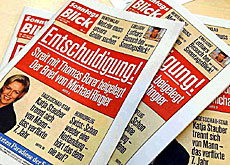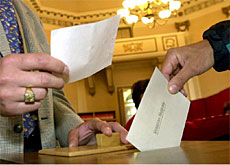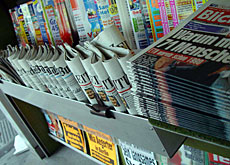Scandal and distrust mar media milestone

The Swiss Press Council is marking its 25th anniversary amid a climate of unprecedented public distrust of the media and fears over press freedom.
But the organisation’s president says the credibility of the media remains intact, insisting that the damage caused by a high-profile press scandal should not be exaggerated.
The reputation of the Swiss press took a serious tumble in May this year when the mass-market “SonntagsBlick” newspaper published claims – later shown to be untrue – that the former Swiss ambassador to Berlin had engaged in an extra-marital affair.
The story ended the ambassador’s career and subsequently led to the sackings of the paper’s editor-in-chief and the journalist responsible for the story.
The case severely damaged the reputation of the paper’s publisher, Ringier, raising questions about the journalistic standards employed on its publications.
Proof of the public’s scepticism came in a recent World Economic Forum survey when more than two-thirds of Swiss respondents said they didn’t trust the national media.
There was further disappointment as the Swiss were ranked in 15th place in an index on press freedom around the globe.
Credibility
Peter Studer, president of the Swiss Press Council, which deals with complaints about the media from both the public and journalists, told swissinfo that the situation was not as dire as it seemed.
“I think one shouldn’t exaggerate what has happened in the Borer case for two reasons,” he said.
“First, it was an incident out of all proportions in Swiss media history; and second, after a while of wavering, the publisher took the consequences, dismissed all the people in involved and apologised to Mr Borer and the public.”
Public distrust
But Studer concedes that the methods used by the SonntagsBlick may have contributed to the public’s negative opinion of the media, as revealed by the recent WEF survey.
“The photographers of these publications ambushed the ambassador and published long articles against him while he was on holiday,” said Studer.
“All the other media distanced themselves from this and the publisher eventually had to apologise. I think this was a very healthy shock and this opinion poll was made at the height of this crisis.”
Press freedom
Freedom of the press is another controversial issue in Switzerland.
A study by Reporters without Borders, a non-governmental organisation which monitors the rights and treatment of journalists around the world, ranked Switzerland only 15th in the world when it came to press freedom.
The organisation said there had been cases where journalists’ phones had been tapped and editors had bowed to demands by advertisers not to disclose information.
Studer, who wants to see the Swiss better placed in the rankings, argues that Switzerland has a very modern and generous constitutional base for press freedom, unlike some higher-ranked countries.
According to Studer, there are several reasons related to the courts and Swiss law which have influenced Switzerland’s ranking, as well as a lack of courage among Swiss journalists.
Legal handicap
“There are a few laws on the books which occasionally do create problems,” explained Studer.
“For example, the right of a person to go to a judge if the person fears that an article detrimental to their personal or economic well-being is about to appear.
“The judge can forbid the publication of this article and if there is an urgent need the judge can even do so without consulting the paper or giving the paper the right to be heard. This law should be changed.”
Studer also maintains that the country’s courts are often manned by judges with an extremely critical attitude towards the media, further limiting press freedom.
Positive outlook
Despite these negative aspects, Studer, whose 40-year long career has encompassed the editor’s chair at the Zurich-based Tages-Anzeiger and work at Swiss television, maintains that the Swiss press still has a lot to offer.
“I think we have a public television which has a reasonably high standard. We have in each region at least one quality paper with commendable standards and we have a very active press life on the lower local level,” he said.
“Apart from that we have a number of quality papers which are good even in international comparison.”
swissinfo, Billi Bierling and Isobel Johnson
May 2002: Borer affair results in public outcry and resignation of editor-in-chief of mass-market SonntagsBlick.
October 2002: Switzerland comes 15th out of 139 countries in world rankings for press freedom.
November 2002: Survey shows that two-thirds of Swiss respondents have reservations about the national media.
November 2002: Swiss Press Council celebrates 25th anniversary.

In compliance with the JTI standards
More: SWI swissinfo.ch certified by the Journalism Trust Initiative



You can find an overview of ongoing debates with our journalists here . Please join us!
If you want to start a conversation about a topic raised in this article or want to report factual errors, email us at english@swissinfo.ch.